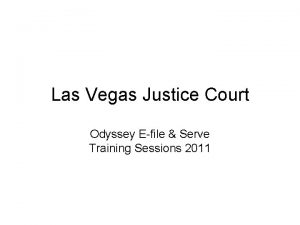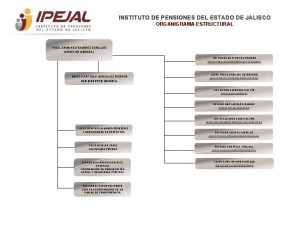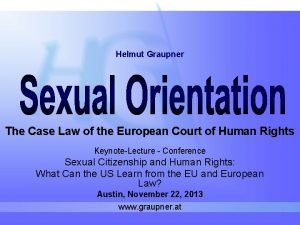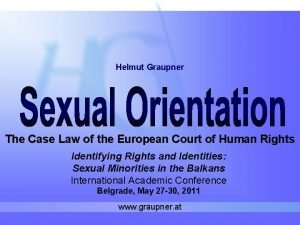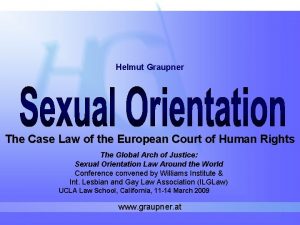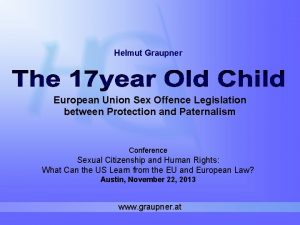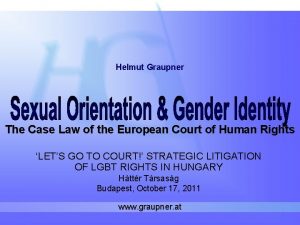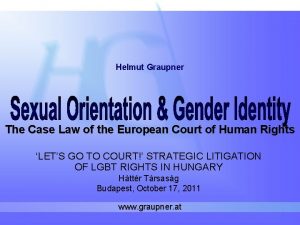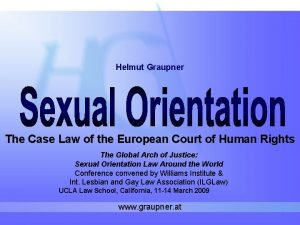Helmut Graupner The European Court of Justice and















- Slides: 15

Helmut Graupner The European Court of Justice and Same-sex Partnerships ECSOL-Workshop LGBT families under European and international law Outgames Human Rights Conference Copenhagen, 28 July 2009 www. graupner. at

Tadao Maruko gegen Versorgungsanstalt der deutschen Bühnen (Vdd. B) (C-267/06) Hans Hettinger: -> costume designer -> 45 years member of Vdd. B -> 45 years paid fees to Vdd. B as his heterosexual colleagues -> 13 years of partnership with Mr. Tadao Maruko -> 2001 registered their partnership -> died 2005 Vdd. B: -> survivors benefits only to married partners -> no pension to Tadao Maruko: -> legal action (Bayr. VG München M 3 K 05. 1595)

Bayr. VG: referral for a preliminary ruling 1. direct discrimination? 2. discrimination justified by recital 22? Recital 22: “This Directive is without prejudice to national laws on marital status and the benefits dependent thereon. ” Vdd. B & UK -> unequal treatment of married couples and registered couples are outside of the scope of the Directive (due to recital 22)

European Commission -> no direct discrimination (no referral to sexual orientation) -> indirect discrimination & no justification visible -> but only: if RP is marriage-equivalent („substantially the same effects“)

Tadao Maruko: 1. Direct discrimination (as referral to pregnancy is direct discrimination on the ground of sex): -> needs not be decided, as in any case 2. Indirect discrimination: -> not only in case of RP equivalent to marriage -> as long as marriage is forbidden for same-sex couples: criterion of marriage always is just „apparently neutral“ and puts homosexuals „at a particular disadvantage” (Art. 2 par. 2 lit. b) -> pay is made contingent upon a condition which same-sex couples never can fulfil -> as in K. B. (2004) (opposite-sex couples with post-operative transgender partner were not allowed to marry): the condition of marriage must be dropped for same-sex couples (as long as marriage is not available) -> Otherwise: little discrimination (in MS with marriageequivalent RP) outlawed, but big discrimination (in MS without such RP) not (despite same unequal treatment)

Advocate General Dámaso Ruiz-Jarabo Colomer: -> no direct discrimination (no referral to sexual orientation) -> indirect discrimination & no justification visible -> but only: if RP is marriage-equivalent („substantially the same effects“) Problem of comparative parameters: Marriage-RP or opposite-sex couples vs. same-sex couples?

The Judgment (01. 04. 2008) • Recital 22: Recital 22 cannot affect the application of the Directive (par. 59 f) • Direct Discrimination -> if registered partners „in comparable situation“ as married partners (par. 70 -73) Art. 2 par. 1 lit. a Dir 2000/78/EC: “direct discrimination …where one person is treated less favourably than another … in a comparable situation, “ -> Justification only possible under Art. 4 Abs. 1 („genuine and determining occupational requirement“)

The „comparable situation“ (1) formally: determination is task of the national court (par. 72 f) (2) in substance: -> „Comparability“, not „Identity“ (par. 69) -> „so far as concerns that survivor’s benefit“ (par. 73) -> individual-concrete comparison with the „situation comparable to that of a spouse who is entitled to the survivor’s benefit provided for under the occupational pension scheme managed by the Vdd. B. “ (par. 73) -> criteria of the national court (par. 62, 69): (a) formally constituted for life (b) union of mutual support and assistance

-> ECJ does not object to these criteria and explicitly says : „The combined provisions of Articles 1 and 2 of Directive 2000/78 preclude legislation such as that at issue in the main proceedings …“ (emphasis added) -> Compare to the judgment in Palacios (2007): “The prohibition on any discrimination on grounds of age … must be interpreted as not precluding national legislation such as that at issue in the main proceedings, …, where …[follow criteria which the national court has to apply in determining compatibility with community law]” (emphasis added)

The Reaction of German High Courts (decisions on family allowance for civil servants, § 40 Abs. 1 Nr. 1 BBes. G) Federal Administrative Court („Bundesverwaltungsgericht“) (2 C 33. 06, 15. 11. 2007): No comparability, as -> RP and marriage are not identical (differences for instance regarding social benefits for civil servants, in tax legislation and joint adoption) -> complete or general equalization was neither done nor intended by the legislator

Federal Constitutional Court („Bundesverfassungsgericht“) (2 Bv. R 1830/06 , 06. 05. 2008): No comparability, as -> no general statutory equalization (a) equalization was not the intention of the legislator (b) no blanket clause (c) special regulations with deviations form the law of marriage -> no complete equalization in the law of public sector employees (still differences in remuneration and pension-rights) -> spouses typically in need of alimony by partner; RP typically not -> irrelevant that civil law maintenance-obligations are identical (in marriage and RP)

Problem: • General equalization -> circular reasoning (if general equalization would have taken place , no inequality would exist, and question of discrimination would not arise) • equalization in social benefits for public sector employees -> circular reasoning (discrimination is justified with another discrimination) • Typical/non-typical need of alimony: -> general-abstract approach which contradicts the individualconcrete view of the ECJ -> family-allowance is not dependend upon a need of alimony (also childless civil servants receive it. Even if their married partner earns more then themselves)

Conclusion • Case law of Bundesverwaltungs- and Bundesverfassungsgericht -> contradict ECJ in Maruko • Even if this view is not shared -> in any way not unreasonable -> obligation to refer to the ECJ (asking for the criteria for the test of comparability) • If situation of married and registered partners are not comparable -> then question of indirect discrimination (by referring to the exclusively heterosexual criterion “marriage”) -> obligation to refer to the ECJ • Maruko could go up to the ECJ two more times

• VG München 30. 10. 2008 (not final): -> awarded survivors pension to Mr. Maruko -> surviving RP and surviving married partners in a comparable situation, as (a) survivors benefits are substitutes for alimony and (b) alimony-duties are the same in RP and marriage • New case Römer vs. City of Hamburg (C-147/08): -> higher retirement pension for employee with married partner then for employee with RP -> even if married partner has higher income then employee and they have no children -> even if RP is in need of alimony by the employee and they have to care for children -> will the ECJ specify or extend the Maruko-judgment?

www. graupner. at
 Is there a basketball court above the supreme court
Is there a basketball court above the supreme court Us circuit court map
Us circuit court map Efile las vegas
Efile las vegas European human rights moot court competition
European human rights moot court competition European court of human rights traineeship
European court of human rights traineeship Helmut weldle
Helmut weldle Corinne pulver fritz eugen pulver
Corinne pulver fritz eugen pulver Organigrama ipejal
Organigrama ipejal Herzfelde
Herzfelde Helmut jungclaus
Helmut jungclaus Die hamletmaschine
Die hamletmaschine Helmut lotti sjukdom
Helmut lotti sjukdom Helmut satz
Helmut satz Helmut knaust
Helmut knaust Dr helmut bacowsky
Dr helmut bacowsky Justus liebig y helmut van helmont
Justus liebig y helmut van helmont


